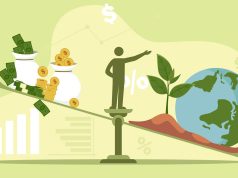Is It Time For ‘Reimagining Sustainability’?
There is a sense of fatigue with people deeply involved in sustainability caused by never ending reporting cycles, many standards and frameworks to disclose against and the difficulty in measuring impact. Are we approaching sustainability in the wrong way? For most enterprises sustainability has meant energy efficiency programs and writing sustainability reports, reports that, unfortunately, very few people read and care about. This process is effort intensive, manual, inefficient and frustrating for most people involved. This is a poor way to engage with employees that are passionate about sustainability and does a disservice to their skills, time and intellect. Keep in mind that many of these employees are millennials, and understand more than anyone else what is happening around sustainability and care deeply that the company they work for is truly making an impact.
At the same time, the sustainability landscape is changing rapidly. The recent developments of the Paris Climate Accord demonstrated the way nations are coming together to make a change. While the US exited from the deal, other nations, including India see that as an opportunity to lead and aspire to go ‘above and beyond’ the commitments from the Paris Climate Accord. Some of the most well-known business leaders including Ratan Tata, Anand Mahindra, Paul Polman, Richard Branson, and Michael Bloombergare pushing global businesses to do more, they are talking about opportunities from sustainability, low costs solutions and the need to ‘price carbon’.
Besides the ‘Nationally Determined Contributions (NDCs)’ from the Paris Climate Treaty to limit temperature increases this century to below 2 degree Celsius from pre-industrial levels, the focus is also on Sustainable Development Goals (SGDs) adopted by the United Nations for the 2030 Agenda. Sustainability appears to be converging around the NDCs that have emerged from the Paris Climate Accord and the 17 SDGs, especially since they are consistent and well aligned to each other. This bodes well for the future, achieving both these sets of goals will be transformational in addressing climate change risks to future generations.
Why then isn’t sustainability a ‘boardroom’ conversation, isn’t this the perfect opportunity for ‘Reimagining Sustainability’? How do enterprises focus on real deal, how can they get ahead of the curve and focus on what is really important and respond to these rapidly changing dynamics?
From my perspective one of the most important things an enterprise can do in terms of ‘Reimagining Sustainability’ is for leadership to step back and first consider what is most important to them. Every enterprise is unique, should they focus on ‘Circular Economy’, should they also look at ‘Societal Valuation’ and ‘employee engagement’. How can existing investments in enterprise resources – people, buildings, infrastructure and cloud applications, stakeholder relationships and supply chain, be aligned to what is most important. Where are the gaps, where do additional investments need to be made and what technology solutions need to be picked, are all important questions to consider.
How do you connect the dots and extract the essential data from across the enterprise, and relevant external sources, build the big data and analytics to help make decisions, budget, plan, and launch transformational initiatives? Who will lead these initiatives and identify the KPIs, which will help you tell all your stakeholders the impact you are having in the areas that are most important to you and to them? How will technology help you prepare for the cascading of NDCs and SDGs, down from governments to enterprises, and anticipate the implications from related regulatory changes?
To do all these companies need to ‘reimagine’ the way they look at sustainability and make it a focus of their core business rather than just reporting. Only if we change our collective attitude towards sustainability, will we truly be prepared, make a difference and tell a real and powerful story to all stakeholders.
 The author, Ankush Patel is the Co-founder & CEO of Treeni Sustainability Solutions, an organization committed to help Indian companies reimagine and embrace sustainability.
The author, Ankush Patel is the Co-founder & CEO of Treeni Sustainability Solutions, an organization committed to help Indian companies reimagine and embrace sustainability.
Views of the author are personal and do not necessarily represent the website’s views.
Regards,
The CSR Journal Team
Subscribe













